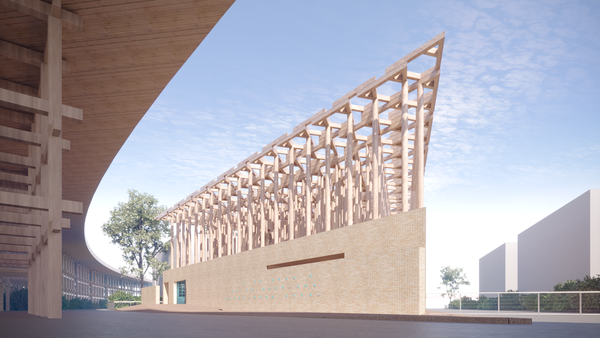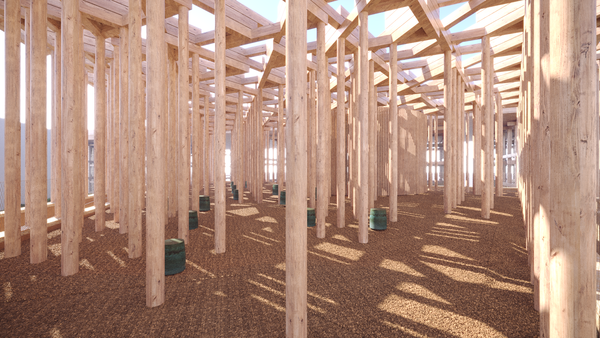Cultural heritage meets sustainable innovation in the Uzbekistan Pavilion at Expo 2025 Osaka

[아츠앤컬쳐] 우즈베키스탄 예술 문화 개발 재단(ACDF)의 이번 오사카 엑스포 파빌리온은 '지식의 정원: 미래 사회를 위한 실험실'을 주제로 ATELIER BRÜCKNER가 디자인하였다. 우즈베키스탄의 풍부한 토양과 아이디어, 혁신이 샘솟는 정원에서 영감을 받았다. 우즈베키스탄 파빌리온은 지속 가능한 건축과 전통에 대한 과감한 재해석으로 2025년 독일 디자인 어워드에서 금상을 수상했다. 2025 오사카 엑스포 이후에는 이 파빌리온을 그대로 우즈베키스탄에서 재조립하여 역동적인 커뮤니티 공간이자 디자인 혁신의 지속적인 상징으로 조성할 예정이다.
우즈베키스탄의 문화 개발의 최전선에 위치한 ACDF는 국가의 문화 생태계를 육성하고, 창의적 경제를 추진하며, 지역, 지역 및 글로벌 무대에서 활동가에게 기회를 제공하는 데 전념하고 있다. 2025년 9월에 부하라에서 첫 번째 부하라 비엔날레를 개최할 예정이다.

Commissioned by the Uzbekistan Art and Culture Development Foundation (ACDF) and designed by internationally renowned ATELIER BRÜCKNER, the Pavilion’s theme is Garden of Knowledge: A Laboratory for a Future Society, inspired by Uzbekistan’s rich soil and fragrant gardens where ideas and innovation take root.
Recognised for its visionary design, the Uzbekistan Pavilion was awarded the Gold Prize at the German Design Award 2025 for its sustainable architecture and bold reinterpretation of tradition.
After Expo 2025 Osaka, the Pavilion will be reassembled in Uzbekistan, transforming into a dynamic community space and a lasting symbol of design innovation.
Tashkent, Uzbekistan, 6 February 2025 – The Uzbekistan Art and Culture Development Foundation (ACDF) announces the theme of the Uzbekistan Pavilion at Expo 2025 Osaka: Garden of Knowledge: A Laboratory for a Future Society. Echoing the overarching theme of this year’s expo – Designing Future Societies for our Lives – the Pavilion, designed by internationally renowned ATELIER BRÜCKNER, celebrates Uzbekistan’s cultural heritage, innovation, and commitment to sustainability.
Inspired by Khiva and the Khorezm region’s architectural and intellectual legacy, the two-storey, 750 square-metre space blends tradition with forward-thinking design, mirroring the life cycle of a garden. Khiva, a UNESCO-listed city, has long been a centre of learning, where generations of scholars, artisans, and merchants exchanged knowledge within its madrasahs and courtyards. The Pavilion reinterprets this heritage as a contemporary space for gathering and exchange. Its structure integrates brick and clay, representing earth and heritage, and sugi wood, a cypress cultivated near Osaka, reinforcing environmental responsibility. The triangular plot reflects the tumar, a traditional Central Asian amulet symbolising protection, while the floor garden evokes Uzbekistan’s landscape serving as a meeting point for visitors.
The Pavilion’s design follows a symbolic journey from planting seeds of knowledge to harvesting ideas. Across three levels, visitors explore immersive thematic areas that highlight Uzbekistan’s forward-looking initiatives, aligned with UNESCO’s sustainable development goals including quality education, lifelong learning, clean energy, resilient infrastructure, and sustainable innovation.
The exhibition highlights Uzbekistan’s transition to a green economy through renewable energy projects, green transportation, and energy-efficient housing. Key projects include theNew State Museum of Art by Tadao Ando and revitalisation efforts in the Ara lSea Basin. The Pavilion also showcases Uzbekistan’s commitment to advanced education, research, and the preservation of traditional crafts.
Starting in the Soil, a ground-level space featuring key sustainability and innovation projects, visitors ascend to the Main Cylinder. A moving platform, using technology new to Japan, offers a 360-degree multimedia experience, tracing Uzbekistan’s transformation from its intellectual heritage to contemporary advancements, highlighting traditions, crafts, and landmarks such as Registan Square in Samarkand. The journey culminates in the Garden of Knowledge, an open-air terrace where overlapping pillars create a dynamic interplay of light and shadow, inspired by the forest of columns in Khiva’s Juma Mosque. Visitors can enjoy an Uzbek tea ceremony, relaxing on traditional ceramic stools designed by Japan-born, Lebanese Nada Debs.
Designed with legacy in mind, after Expo 2025 Osaka the Pavilion’s modular components will be disassembled and reconstructed in Uzbekistan, eventually becoming a studio, workshop, or an educational space.
About the Uzbekistan Art and Culture Development Foundation
The Uzbekistan Art and Culture Development Foundation (ACDF) preserves, promotes and nurtures Uzbekistan’s heritage, arts and culture. Positioned at the forefront of Uzbekistan’s cultural development, ACDF is committed to fostering the cultural ecosystem of the country, driving the creative economy, and providing opportunities for practitioners on a local, regional and global stage.ACDF believes that culture and heritage are vital in shaping society, uniting communities, bridging generations, and facilitating cross-cultural conversations.
In Tashkent, ACDF has successfully led the fourth edition of the World Conference on Creative Economy (WCCE) (2-4 October 2024) and currently spearheads the inaugural Aral Culture Summit (4-6 April 2025) in Nukus, Karakalpakstan, Uzbekistan’s participation in Expo 2025 Osaka, Kansai, Japan (April – October 2025), the renovation of the Centre for Contemporary Art in Tashkent, the construction of the new State Museum of Arts designed by Tadao Ando, and the restoration and partial reconstruction of the Palace of the Grand Duke of Romanov. ACDF has also launched “Tashkent Modernism XX/XXI”, an ongoing research project documenting and protecting the city's modernist architecture, highlighted by two significant publications in collaboration with Rizzoli New York (published in November 2024) and Lars Müller Publishers (to be published in spring 2025). In Bukhara, ACDF is launching the first Bukhara Biennial in September 2025.
Pelham Communications 제공

